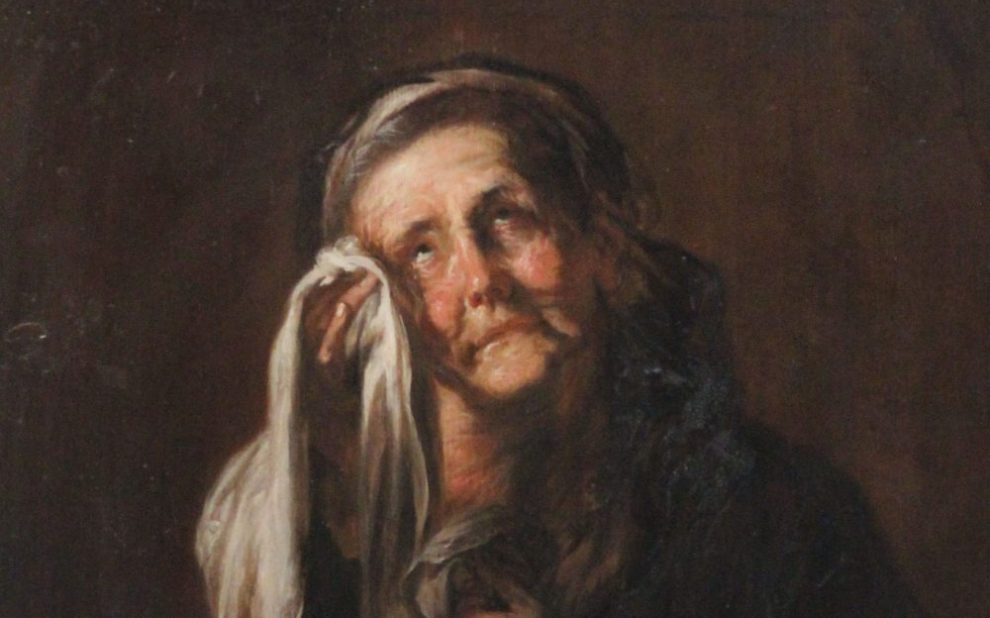In my years since becoming a parent, I’ve heard myself, not infrequently, repeating the aphorisms and one-liners that formed the soundtrack of my childhood.
“If you can’t say anything nice, don’t say anything at all.”
“It’s all fun and games until somebody gets hurt.”
“If you’re fighting, you must be bored.”
“If you’re bored, I can give you something to do.”
“You can tell your therapist about it someday.”
Even as I speak the words, they echo through my mind in my mom’s voice.
That last one—“tell your therapist about it someday”—I like to imagine an anachronistic St. Monica saying to her son Augustine. The mother-son saintly duo may have preceded Freud and the birth of talk therapy by a millennium and a half, but time notwithstanding, Monica certainly gave Augustine plenty of fodder for the therapy couch.
As she submitted without complaint to her volatile husband’s ongoing abuse, Monica exposed Augustine to what we call in today’s therapy terms an adverse childhood experience—the kind of event that occurs in one’s early years that has the potential to cause lasting trauma. Later in Augustine’s adulthood, Monica meddled in his relationships and hounded him until he eventually surrendered to her wishes and gave up the woman he loved because Monica deemed her an unsuitable match for Augustine. But even though Monica willingly accepted her husband’s abuse and violated appropriate boundaries with her adult son, she is often held up within Catholic circles as a model wife and parent. Indeed, she is the patron saint of mothers.
In many ways, the church’s decision to endorse St. Monica as an exemplar of faithful living isn’t surprising. She joins a whole host of child brides, martyred virgins, and victims of assault in her place as a canonized woman within the Catholic Church. For those of us who take issue with aspects of the example that Monica sets—which I would wager is most of us—we’re left with the question of how to approach the saint. We could dismiss her, along with thousands of her sister saints, as a pawn of the patriarchy’s attempt to systematically oppress women, and decide that we have nothing to learn from this particular wife and mother. Or, we can mine her story for the nuggets of wisdom and guidance, ones that don’t oppose our modern, feminist sensibilities, and use those to light our way on the arduous journey of parenting.
I’m in favor of the latter, and I find that it actually isn’t too difficult, because it’s not as if Monica had a mix of good and bad qualities (e.g. she was generous but also had a lying habit) where a blind eye is required to overlook the problematic in order to appreciate the positive. Rather, Monica’s problem, the way I see it, is that she took her good qualities too far.
Take, for instance, Monica’s loyalty to her husband Patricius, a Roman pagan, and her mother-in-law, who lived with the young couple. Both Patricius and his mother were known for their violent tempers, and Monica is lauded for accepting their failings and praying for them throughout her life until they both eventually converted to Christianity (and hopefully remedied their anger management problems, although I suppose we’ll never know).
While there is no part of me that doesn’t see accepting violence and loyally standing by an abuser as deeply problematic, that doesn’t mean that acceptance and loyalty aren’t—on their own, not taken too far—qualities worth striving for in one’s marriage and in one’s relationship with their in-laws. The philosopher Aristotle has a concept that I find useful when considering the case of St. Monica: the golden mean. To Aristotle, moral behavior is the mean between the two extremes of excess and deficiency. Monica took loyalty and acceptance to the point of excess, but as I am someone who is often inclined to be deficient in terms of acceptance, I have something to learn from her.
Or, consider Monica’s commitment to her son’s moral and religious formation. If you know the gist of St. Augustine’s spiritual autobiography, The Confessions, you’ll know that Augustine got into his share of antics as a teen and young adult. He was lazy and uncouth; he slept around and drank too much; he surrounded himself with friends who were a poor influence, and he failed for a long time to return his mother’s care and affection. Despite Augustine’s wayward ways, St. Monica didn’t give up on him, not only instructing her son towards change and praying tirelessly for him, but sending him away to school with the hopes of improving his peer group. Monica is a model in enduring love and persistent effort.
Now, I’ve never been a parent of a teen, so it’s impossible to say how I would react to my children behaving like youthful Augustine, but I do have in my home what the parenting blogs sometimes refer to as a “three-nager” whose days include meltdowns, refusals to share, less than charming table manners, and nerve-wracking whines. My role as a parent is to teach, model, and accompany my child through these behaviors so as to refine (if not entirely eradicate) them; but, frankly, that level of effort can be exhausting, and there have been times when I’ve felt inclined to abdicate my role as a parent, ignore the bad behavior, and cross my fingers that the screaming/hoarding/spitting/shrieking will resolve themselves without any effort from me.
At times like this, I need St. Monica’s example of persistence, hope, and faithfulness. Monica was a mother who knew that her son was capable of good and had confidence in her role as a capable parent. She did not leave Augustine’s improvement to chance and involved herself in his formation until she saw him through years or trouble into to responsible—and in his case, saintly—adulthood.
Did Monica take loyalty too far by accepting her husband’s abuse? Did she overstep the healthy bounds of parental persistence when she forced her son to leave a woman he loved? Yes, and yes, by my estimation. But that doesn’t mean that we don’t have something to learn from Monica. We can see with admiration and emulate the best of her committed devotion and indefatigable parenting; we can acknowledge with honesty the danger and toxicity to which excessive amounts of these qualities lead.
Of course, seeing the mixed bag of Monica’s being (she was deeply good…and deeply problematic) poses the question of whether we should bother with Monica as a guide within the realm of family life at all. Yes, she was loyal and persistent, but so are a lot of people—without the baggage that Monica carriers. We live in an era where there is no shortage of information or the ability to connect with role models and experts; why turn to Monica when there are so many other options of exemplary wives and mothers?
I guess there is a part of me that just appreciates the messiness of Monica’s story. She was a woman who was struggling to survive and make sense of various conflicting forces in her life. I relate to that. There are so many times when I am not the parent or the spouse or the person-in-the-world that I want to be, and while sometimes my shortcomings are attributable to selfishness or lack of discipline, just as often they are the result of weariness, stress, or a sheer lack of time. It is hard to be a member of the non-owning class under capitalism, and it is hard to be a parent in a country that does a pretty abysmal job of supporting families, just like it was hard for Monica to be a Christian woman in a patriarchal society of the Roman Empire. Yes, Monica took her loyalty to her husband and her involvement in Augustine’s life too far, but my hunch is that she was doing the best she could, given the external circumstances of her life. To me, that’s worth honoring, even if we see clearly how damaging much of her behavior was.
If it were up to me, I might relabel St. Monica, replacing her identity as patron saint of mothers with the title “patron saint of doing the best you can.” I’ll look to the psychologists, physicians, therapists, and teachers of the 21st century for guidance in the child-rearing realm, but I’ll turn to Monica for the spiritual encouragement to carry on and keep trying when times are tough. As a parent in today’s world, I think that’s exactly what I need.
Image: Wikimedia Commons/Michael Willman, St. Monica, 1660-1670













Add comment